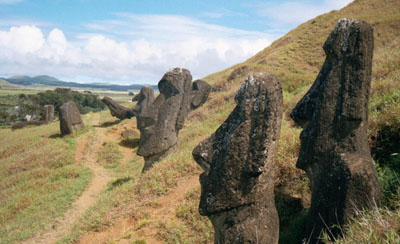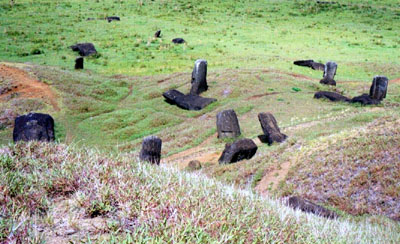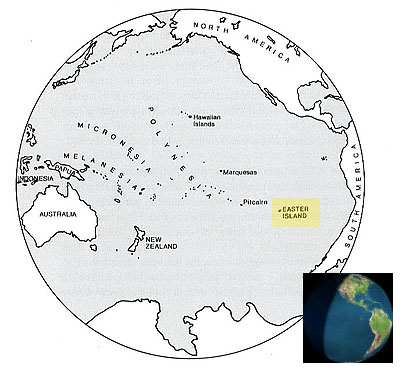Lonely
A True and Fictional
Tragical Historical yet Comical Account
Of the Myriad Mysteries and Enigmas
Of
by
Clayton Bess
Chapter One only
All Rights Reserved: This manuscript or any portion thereof may
not be reproduced in any form without the written permission of the author or
his agent.
© Robert Locke 2006
http://webpages.csus.edu/~boblocke/index.htm
Lonely Island
Chapter One
The Mysteries
They
say we ate people. I think probably we
did.
But
that was a long time ago. I was not even
alive. I myself did not eat the people,
not myself. Our people did. If they did. And although
I think they did, what does that have to do with me? What does that have to do with today? Perhaps we will need to eat people
again. Things happen that way sometimes
when you live on an island.
They
say we are a friendly people. I do not
think I am friendly, so much. I do not
think I am unfriendly, either, so
much. I am who I want to be: Toromiru.
From
the way I am writing this, you are going to think I am mad. And perhaps I am mad. Perhaps that is the
reason I am writing this, because I am mad.
I am mad because people from so many different places around the planet keep
coming here to look at us. They want to
take our photos. My brother is very
handsome and my sister is very beautiful; so these many people from their many
places want photos of my brother and sister especially. My brother says, “Why? Where will I see that photo?”
The reason my brother says that? Perhaps my brother is mad, too. He knows that when the people go back to
their homes around the planet, then perhaps they will use that photo in a story
that perhaps they will write about us. So
many different people are always writing about us in so many different
languages. They all descend upon us
wanting to know about our island because our island is “mysterious” and our
island is an “enigma” and so what? And we
are the people who live on this “mysterious and enigmatic island” and so
what? And so they put our photos in
their stories. And sometimes what they
write is not true or even close to true, but they have our photos anyway. But when my brother asks them why they want
his photo, he says it with a grin, and they go ahead and take his photo
anyway. But I think inside, perhaps, my
brother is not grinning.
My
brother is the one who takes the different peoples who speak English. I call them the Englishers: the Americans and English and Australians, of
course, but also usually the Germans and the Japanese, and all of those who
understand the language of English better than they understand the language of Spanish. My sister is the one who takes the Spanishers. Those are the different peoples from
I usually follow my brother
so that I can learn the English better.
I am not allowed to lead the tours yet—if ever?—because I am too
young. Or that is what they say. But that is not true either. I am certainly old enough, but perhaps no one
trusts me enough, which is why I ask—"if ever?"—in
the way that I do. There is
always the matter of the lying and the doubting vis a
vis the telling of the truth, that which is prickly.
I can take the Spanishers
better than my sister because I have read many more books than she. And because I have followed my brother so
many times I can do the Englishers equally good as to him. Perhaps better because I am always listening
to the Englishers talking to each other at the same time my brother is talking
to them. So I know the questions they
have but do not have the opportunity to ask him. Or perhaps they do not want to ask him for
fear of offense, and often these questions are indeed offensive, but then, what
is to be done about that?
My brother sometimes reads
some books, but so do I. And I
listen. And I always tell the truth,
except out of playfulness. My brother
sometimes makes up the truth. If he does
not know an answer to one of their questions, he might open his eyes wide and
lower his voice to a whisper and say, “It is a mystery.” He knows this always works because everyone
who comes here knows already that our island is full of mysteries and enigmas;
in fact, as I have indeed explained already, that is exactly why they do come
here. And what they do then, when my
brother tells them it is a mystery, and opens his eyes wide? Then will they nod their heads very slowly
and open their eyes wide also, like my brother, and raise their eyebrows. It is very comical. You would laugh to see it.
My
sister makes up her own truth all the time because she does not really know
anything, and that is the easiest. The
other day at Rano Raraku a man from
My sister then replied,
“Yes, between two and three thousand years!
No one knows! It is a mystery!” My sister learned that trick from my brother,
you see. Only since she was speaking in
Spanish to the Spanishers, what she actually said was, “ˇEs un misterio!” In Spanish, you are called upon to put the
exclamation marks at both ends of the sentence, which of course doubles your
exclamatory effect. And because of the extra
vowel sounds in Spanish, I have found that you can open your eyes even wider
and you can stretch out “misteeeeeeeerio” for a longer time. In English, you would have to say “mysssssssstery”
to say it long enough to open your eyes wide enough to get the same effect, and
that would make you too silly to take serioussssssssly.
The Frenchman then turned to
his wife and translated into French for her:
"Ah, oui! Un
mystččččččččre," opening his eyes wider, I believe than anybody I have yet
seen. The French are even more
impressionable than anyone else, as you will see later.
I have
read very many books about our island and our people, but still my brother and
sister do not let me lead the tours yet.
I think they think I know too much.
I think they think I will get confused.
Perhaps they are right. The more
you know, the more you know you do not know.
One
of the good things about following my brother or my sister when they take the tours
is that the people begin to look upon me as one of the mysteries. I never say anything, and that is mysterious
to most people. And when there are
people who are my age, they are drawn to me because of my mysteriousness. Also because I am their
age. Have you noticed that? Young people like to be with young people,
especially if they are traveling with their parents who are, often, very dull to
them. And so I wait. I look at the young people with my eyes, and
I know they will come to me. At night, I
make sure that I am near their hotel, and that they see me. Then they will always come to me. They always want to sneak out of their hotels
at night to the same places they went during the day, with me, alone, in the
darkness, with only the moon to show us the island.
I
can drive. I am not allowed to drive,
but I drive anyway. My favorite times
are when the young people want to go back out to Rano Raraku, which is my
favorite place. This is the quarry where
the moai were carved out of the volcano and where they still stand, still
waiting—after all these centuries—for their carving to be finished so that they
can be moved to the shore. The mana of
the moai is like electromagneticity, I believe, as I think I understand that
word; the air hums with their mana; the breezes move among the moai and through
the waving grasses like fishes in schools, and you can gulp them; in the
moonlight in the dark you can breathe the mana into your own body, and you can
be one with them.

Figure 1: Here are a few of the moai at Rana
Raraku. Can you feel the mana of the
moai from this photograph? I think
not. I do believe you must be with the
moai to feel their mana. And the mana of
the moai is most powerful at night, when a camera does not work properly. A photo from a camera is not the best way to
capture moai, to capture them as you might a school of fish, in one gulp.
The
moai at Rano Raraku face down the hill, those that are not fallen down. All of them stand at different heights, all
of them from one-quarter to three-quarters buried, some with only the tops of
their heads showing, looking as though they are trying to keep their noses
above the soil which each year grows a little higher up their necks. Most of the moai are straight up and down
upright, but some of them are at an angle, as though they are drunk. In the moonlight, they are beautiful, and
they are sad. And if it is a girl that I
take there in the moonlight to Rano Raraku, she might cry. If it is a boy, he might be completely quiet
as we walk among my ancestors on the edge of the volcano. There is no talk of the mysteries because the
mysteries are right there revealed to us, surrounding us, blowing the breezes
that wave the grasses at our feet.

Figure 2: Here is another angle at the moai, again
hoping to capture the mana of the moai for your eyes, again probably failing by
nature of a mere photograph.
If
I can get my compadres to dare to climb to the top of the volcano, one of the
highest places on the island, we can see the ocean all around us, shining a rippling silver in the moonlight. For me this is something truly special and
stirring to my soul. For the others,
they are then thrilled. Or they may be
terrified.
One
girl named
She
kept saying how far we were from anywhere.
Even though she had flown over the broad Pacific Ocean from Kansas to the
island of Tahiti, and
from Tahiti the two thousand four hundred miles across that same ocean to our
island, and even though she had been on top of Rano Raraku in the daylight, it
had not yet sunk into her head how far she was from the rest of the world. She kept saying, “What if…” but she could not
finish the thought. This is what I think
she thought: I think she thought, “What
if this island sinks into the ocean?” or
“What if the plane tomorrow cannot take off before it reaches the edge of the
island, and we crash into the ocean?” which always appears to me a distinct
possibility, as I watch the airplanes come and go in their little
hugeness. Or perhaps

Figure 3: Where
These
thoughts of
There was one of the Englishers who was named Daniel. He
looked older than me by perhaps a year or two, with the soft beginning hairs of
a beginning beard. Perhaps he was seventeen
or eighteen, although I have found it very difficult—with so many peoples of so
many places—to guess at age because their styles of dressing and of acting are
so different. I think, too, that Daniel
was from one of the islands of
I think Daniel had read in some of
the books about how our people are sexy, and I think that is what Daniel
wanted: sex. But the ways of Daniel were gross, and I
think none of our people would want to play with him. Our people may be sexy and very playful, but
they are not gross.
Daniel wanted me to show him The Cave
Where Men Are Eaten. On some of our maps,
it is called
I think Daniel was attracted by the
name of the cave. He wanted me to tell
him about the great battle of “The Long-Ears” and “The Short-Ears” and when I
would not—because that is a story I do not like, although I will tell it to you
later—Daniel then wanted me to tell him a different bloody story. This other bloody story that he must have also
read about somewhere in the many books written about our island was about a
different battle. In this other battle a
warrior said to his men, "Bring me the body of the man with the beautiful
name so that I may eat him." Daniel
wanted to know what that name was. I
pretended I did not know that story because that is also a story I do not
like. I did, however, know the
name. And I shall tell it to you (in a
whisper) at the appropriate time.
But
for now, I just want you to know that after I showed Daniel The Cave Where Men
Are Eaten, I left him there alone, because of repugnance and because I was
afraid he would take the flashlight from me because he was much more powerful
than I. I climbed out of the cave, and I
did not come back for him. That was
probably dangerous for him, on the rocks above the ocean, but there was a full
moon, and his ways were gross. I think
he may have tried to make trouble for me after that, and I think that is one of
the reasons why my brother and sister do not let me lead the tours, even though
I am qualified. Perhaps they are
right. Perhaps they are not.